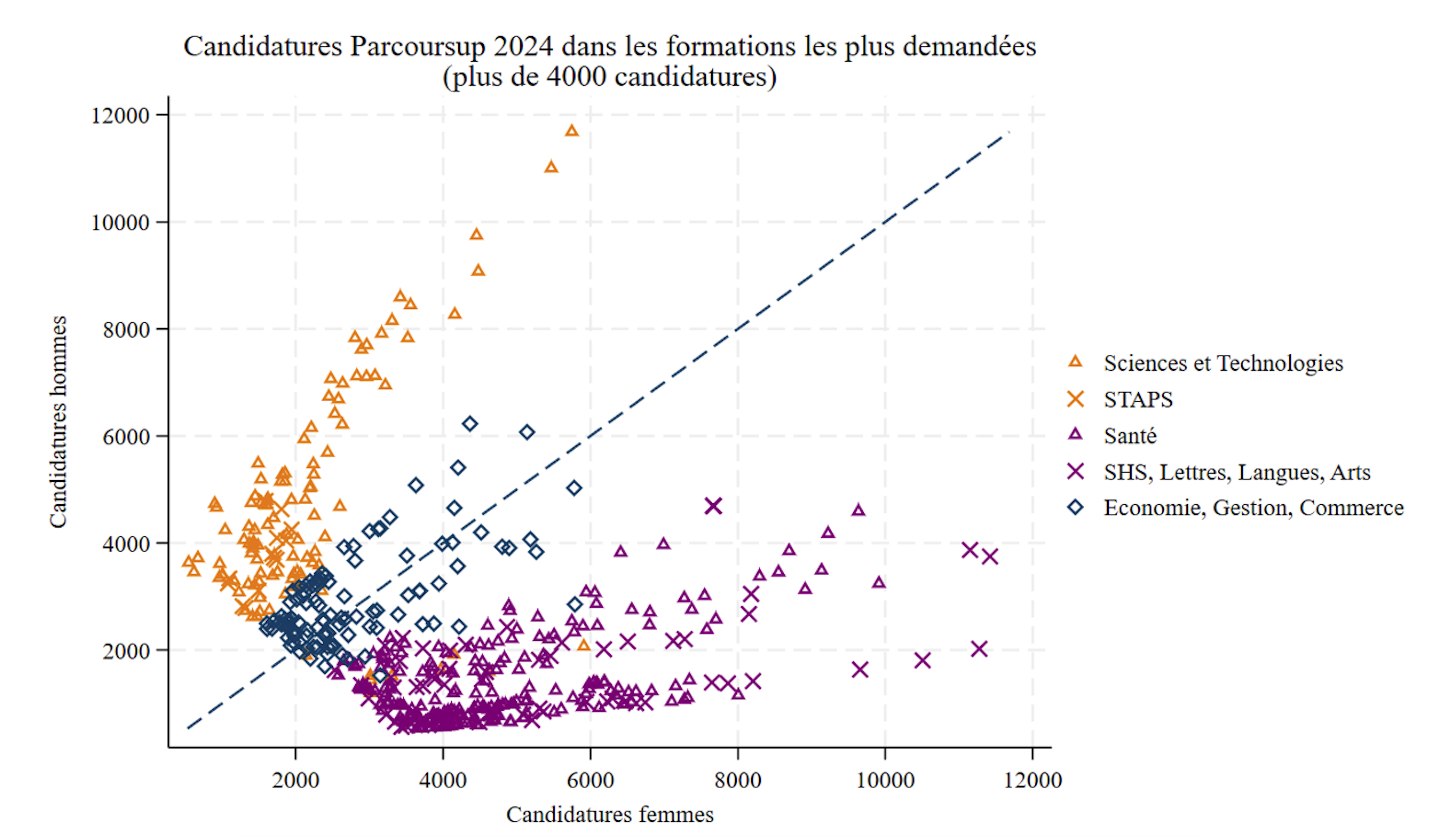Girls in France are much less inclined than boys to pursue scientific fields of study, and this is partly due to persistent gender stereotypes. But other factors also come into play. These explanations are based on a survey by the Chair for Women’s Employment and Entrepreneurship at Sciences Po.
How can we attract more women in France to higher education in science and technology? For several years, public authorities have been supporting initiatives aimed at promoting gender diversity in these fields of study, the most recent being the “Girls and Maths” action plan, launched by the ministry of national education, higher education, and research in May 2025.
There are two main reasons behind these initiatives. On the one hand, the aim is to reduce gender inequalities in the labour market, particularly the pay gap. On the other hand, the objective is to support economic growth in promising fields by training more people who can contribute to innovation in strategic sectors of activity.
Different choices
The differences in orientation between women and men remain very marked at the start of higher education. This is evident from the choices made by high school seniors on Parcoursup, the French platform for accessing post-baccalaureate programmes, as can be seen in the following graph based on data made available on Datagouv. It represents the number of applications for the most popular courses of study (more than 4,000 applications).

The points above the diagonal represent programmes with a predominance of male applicants, while those below represent programmes with a predominance of female applicants. Men account for approximately 70% of applicants to science and technology programmes, including STAPS (science and technology of physical education and sports).
The main exceptions concern courses in life and earth sciences, for which there are more female applicants. Programmes in economics, management, and business (in blue) tend to be more mixed. Finally, programmes in health, humanities, social sciences, literature, languages, and arts (in purple) are mainly favored by women, who account for around 75% of applicants.
Certain factors that may explain these differences in study choices, in particular the role of gender stereotypes, differences in academic performance in science subjects, and self-confidence, have already been analysed.
Passion as a determining factor
In order to better understand the current reasons for the differences between women and men in higher education choices, the Chair for Women’s Employment and Entrepreneurship at Sciences Po conducted a survey in partnership with Ipsos in February 2025 among a representative sample of the student population in France, with a total of 1,500 responses. The results of this survey were published by the Observatory of Well-Being of the Centre for Economic Research and its Applications (Cepremap).
One of the striking findings of the survey concerns the differences between women and men in the importance they attach to passion as a determining factor in their higher education choices.
Significantly more female students choose courses related to their passions, and they seem to do so fully aware that these choices may penalise them later on in the job market. In fact, 67% of women (compared to 58% of men) say they “prefer to study a subject they are passionate about, even if it does not guarantee a well-paid job”, while 33% of women (compared to 42% of men) say they “prefer to get a well-paid job, even if it doesn’t guarantee that they will study a subject they are passionate about”.
Women who prioritise passion are more likely to enrol in arts and humanities programmes, while those who prefer a well-paid job are more likely to enrol in economics, business, and commerce programmes, or in science and technology programmes.
The role of parents
Furthermore, the survey results highlight the fact that parents are more influential in determining their sons’ educational choices than their daughters’. In fact, female students receive more support from their parents, regardless of their chosen field of study, while male students are less likely to receive their parents’ approval, particularly for fields of study that lead to less lucrative careers in the job market (eg humanities, social sciences or arts) or that have become feminised (eg law or health).
Paradoxically, the lack of parental influence on girls’ choices may explain why they are more likely to follow their passion, finding themselves more constrained in the job market later on.
The results also show that preferences developed for different subjects in secondary school account for more than half of the differences between women and men in their higher education choices.
Women appear to have more diverse tastes, with a preference for mathematics accounting for only a small part (around 10%) of the difference in study choices. This partly explains why women tend to shy away from science and technology courses of study, which may be perceived as requiring them to give up other subjects they enjoy. More men than women enjoyed only science subjects in secondary school (29% of male students compared to 14% of female students).
Multidisciplinary programmes and role models
If the French economy needs more women with degrees in science and technology, how can we attract them to these fields? The main challenge lies in conveying a passion for science and technology to women.
This can be achieved through role models, such as high-achieving people who share their enthusiasm for their discipline before students make crucial choices. This can also involve the development of multidisciplinary courses that combine science, social sciences, and humanities, so as to offer young women (and young men) with varied interests the opportunity to pursue scientific studies without giving up other fields.
Finally, science programmes can adapt their educational offerings to make teaching more attractive to female students. By highlighting how science and technology can contribute to the common good and address the challenges of contemporary societies, a reformulation of course titles can, for example, highlight issues that are important to them.
Created in 2007 to help accelerate and share scientific knowledge on key societal issues, the Axa Research Fund – now part of the Axa Foundation for Human Progress – has supported over 750 projects around the world on key environment, health & socioeconomic risks. To learn more, visit the website of the AXA Research Fund or follow @ AXAResearchFund on LinkedIn.
This article is republished from The Conversation, a nonprofit, independent news organization bringing you facts and trustworthy analysis to help you make sense of our complex world. It was written by: Anne Boring, Erasmus University Rotterdam
Read more:
- 10 years ago Kenya set out to fix gender gaps in education – what’s working and what still needs to be done
- Education and gender equality: focus on girls isn’t fair and isn’t enough – global study
- Trans students benefit from gender-inclusive classrooms, research shows – and so do the other students and science itself
The collection of data was funded by the Chair for Women's Employment and Entrepreneurship (Sciences Po, Paris).


 The Conversation
The Conversation
 Laconia Daily Sun
Laconia Daily Sun Brownwood News
Brownwood News The Hill Politics
The Hill Politics Las Vegas Review-Journal Politics
Las Vegas Review-Journal Politics Vanity Fair
Vanity Fair Vox
Vox People Human Interest
People Human Interest Raw Story
Raw Story FOX 32 Chicago Sports
FOX 32 Chicago Sports Country Living
Country Living